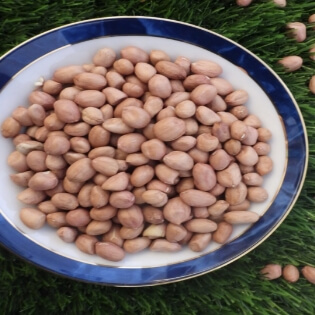BENEFITS OF PEANUTS

Surprisingly, peanuts are not actually in the nut family. They are classified as legumes along with foods like green peas, soybeans, and lentils. Many people believe the peanut is not as nutritionally valuable as true nuts like almonds, walnuts, or cashews. But actually, peanuts have many of the same health benefits as the more expensive nuts and should not be overlooked as a nutritious food.
Nutritional Count Of 1 Cup Peanuts Serving -
- Calories – 828 cal
- Protein – 37.6g
- Fats – 71.8g
- Carbohydrates – 23.55g
- Dietary Fiber – 12.4g
High In Protein
- Peanuts are rich in proteins and are a good source of proteins for vegetarians. Like most legumes, they provide a lot of plant-based protein. In fact, peanuts have the highest protein content out of all commonly consumed nuts.
Improves Heart Health
- Eating peanuts may help protect against coronary heart disease. A study conducted, found that peanuts may lower bad cholesterol levels. Bad cholesterol leads to plaque development in the blood vessels, and peanuts may prevent this. The resveratrol in peanuts has antioxidant properties that may help combat heart disease. That is why peanuts seem to have similar cardioprotective effects as other foods containing resveratrol.
Prevents Gallstones
- gallstones are small particles that form in the gallbladder. Certain people are at higher risk of gallstones, including women, overweight individuals, people over age 40, and those with a diet high in calories and refined carbohydrates. In a long-term study of nurses, scientists found that eating high levels of nuts particularly peanuts lowered risk of gallstones by 25%. The nutrients in peanuts help to protect your gallbladder, but eating at least one serving of peanuts per day is associated with reduced risk of gallstone formation.
Impacts On Blood Pressure
- It was found that peanuts have various bioactive compounds which might help lower blood pressure. Thus, it might also help reduce the risk of heart diseases and stroke. A combination of high glycemic load mix with peanut butter may help in stabilizing the blood sugar levels. Peanut butter is a good source of healthy monounsaturated fatty acids which may help lower blood pressure.
Good For Alzheimer’s Disease
- Peanuts have vitamin E and niacin, which might have the potential to protect the brain from Alzheimer’s disease. It was seen that niacin might have the potential to slow down the rate of cognitive decline. Therefore, peanuts might have the potential to help reduce the incidence of Alzheimer’s disease due to the various bioactive compounds present in them.
Reduces Inflammation
- It is hypothesised that the presence of useful fats, dietary fibres, arginine, magnesium and antioxidants in peanuts might help in regulating inflammation. One of the studies, showed that dietary factors may help in relieving inflammation. Therefore, peanuts might help reduce inflammation.
- Peanuts can be consumed as it is, or they can be used for making various snacks and products. They are used for cooking, for example in soups and desserts. Peanuts are healthy. Peanuts and peanut products are superbly healthy. They are chock-full of nutrients like protein, fiber, healthy fats, vitamins & minerals.


